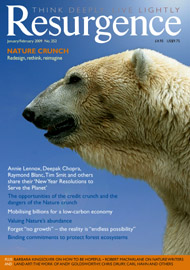TWO MONTHS AFTER its publication, The Transition Handbook has already gone to a second edition because Rob Hopkins has written a most timely and practical book. Its subtitle, From Oil Dependency to Local Resilience, makes explicit the motive for the book. It is concerned with the establishment of communities that are more locally oriented and also with the creation of a society that has much less need to travel and move goods around the planet.
As I read the book, it was impossible not to be affected by Hopkins’ enthusiasm and optimism. He adroitly avoids dwelling on the doom scenarios predicted by some eco-pundits. He simply states that this is where we are and this is what will probably happen, and then suggests what each of us can do about it. He is passionate without being dogmatic. His writing presents the case for common sense. I share some of his optimism and I am convinced that local, practical actions could help to meet the challenges of the oil crisis and of climate change. It is evident that we must all confront our contribution to these crises.
Having read the book, however, I am left with a sense of uneasiness. There is some sense in which the Transition Movement with its emphasis on the local might encourage a certain insularity in a world marked by increasing internationalism: world trade has been with us for thousands of years after all, and we live in a world of instant, international communication. I am left wondering what the eventual consequences of localism might be.
It may well be that concentrating trade and activity into a more self-
sufficient community would go some way towards answering the global problems to which we contribute, but it might induce a more tribal culture, protectionist attitudes and a sense of ‘Townism’ which could reflect some of the more negative aspects of nationalism. I may be feeling unnecessarily uneasy but many people have spent their lives striving to gain some sense of internationalism, some understanding of our interconnectedness. They may be reluctant to give that up.
The second issue that I was left with after reading the book concerned practical skills in local communities. In Britain we have become rapidly de-skilled in the areas of manufacturing and the crafts. Most of what we use to go about our daily lives is made in other parts of the world. Some of it is made under ‘Fair’ conditions and some of it is not. If the oil crisis pushes us towards doing and making more things locally then we have some rapid re-skilling to achieve and a lot of small manufacturing to re-establish. A simple illustration is that of the potters who have moved from making utilitarian wares to one-off ceramics that can demand art prices. This has been accompanied by a loss of skill.
Many of us realise the benefits of local, seasonal food, yet we have been rather slower to examine the context in which we eat it. We enjoy the farmers’ markets that are flourishing, but I am less convinced by the other aspects of the way we eat. Do we know the origins of the plates, knives and forks or the table and chairs that we use as we eat? Probably not, but it is quite likely they came from IKEA or from China. We have got used to cheap goods that are cheap because they have been made at high personal cost to anonymous factory workers in far-away places. We are in no position to produce such budget goods locally.
So the question remains: how are we to become more consistent, more aware and more progressive without engendering insularity? If we follow the route to Transition Towns, these may become communities with an enviable quality of life. In an oil-deprived world which is heating up, how will that envy display itself? Am I alone in wondering what might happen in a society where some have created a more pleasant and successful Transition community whilst others are driven by shortages and revert to baser instincts where conflicts arise? Transition Towns might eventually become the focus of hungry migrants from impoverished and deprived areas. I do hope my uneasiness turns out to be ill-founded.







